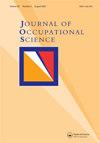Beyond ‘bad’ behaviors: A call for occupational scientists to rethink autism
IF 2.4
Q1 SOCIAL SCIENCES, INTERDISCIPLINARY
引用次数: 2
Abstract
ABSTRACT In this paper, I explore how autistic behaviors are rendered Othered transgressive acts in general research and in the figured world of occupation. I assess how the normalization agenda, which aims to condition autistic people into appearing abled, is associated with endemic disparities. I contend that occupational science has often countered anti-autistic stigma. However, I analyze how the field has perpetuated ableism by replicating normalization ideology and through its silence on the occupational significance of autistic behaviors. To contrast dominant assumptions, I examine autistic ways of being within occupational frameworks. I propose that the field can foster inclusion, rethink its figured worlds, and recognize autistic behaviors to promote social responsiveness. I argue these steps are ethically imperative as evidence on the harms of normalization accumulates.超越“坏”行为:呼吁职业科学家重新思考自闭症
在本文中,我探讨了自闭症行为是如何在一般研究和职业世界中呈现其他越界行为的。我评估了旨在使自闭症患者表现得有能力的正常化议程是如何与地方性差异联系起来的。我认为,职业科学经常反驳反自闭症的污名。然而,我分析了这个领域是如何通过复制正常化的意识形态以及通过对自闭症行为的职业意义的沉默来延续残疾歧视的。为了对比占主导地位的假设,我研究了自闭症患者在职业框架内的生存方式。我建议该领域可以促进包容,重新思考其数字世界,并认识到自闭症行为以促进社会反应。我认为,随着有关正常化危害的证据越来越多,这些措施在道德上是必要的。
本文章由计算机程序翻译,如有差异,请以英文原文为准。
求助全文
约1分钟内获得全文
求助全文
来源期刊

Journal of Occupational Science
SOCIAL SCIENCES, INTERDISCIPLINARY-
CiteScore
4.30
自引率
41.70%
发文量
46
 求助内容:
求助内容: 应助结果提醒方式:
应助结果提醒方式:


